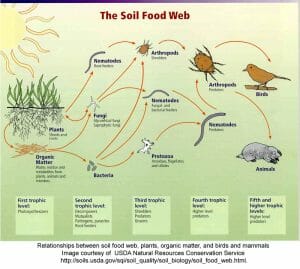The organisms that occupy the decomposer trophic level of the food web on Earth are vital to the existence of life on the planet. Bacteria, fungi and worms take the dead and decaying material and break it down (decomposition) so that the components can be recycled through the biogeochemical cycles. If there were no decomposers, plants would not be able to get nitrogen from the atmosphere to use in their biological processes, and some of the trace elements essential for life would remain bound up in rotting organic material. This would cause a chain reaction that would interrupt the natural flow of energy and molecules through the biogeochemical cycles, and result in the death of producers and consumers in the food web as well.

The image above shows the interdependence of all the components in the soil food web. If one trophic level is impaired or eliminated, the entire system will be affected.
References
- OpenStax, Biology. OpenStax. May 20, 2013. http://cnx.org/content/col11448/latest/
